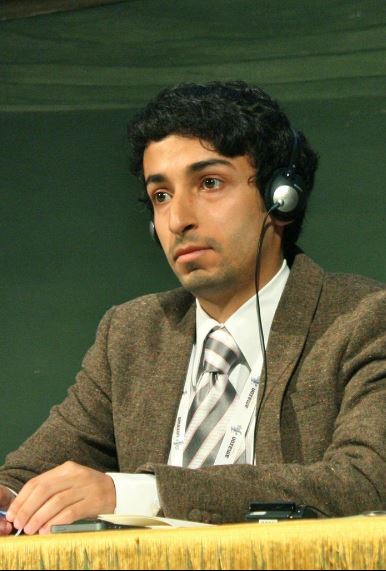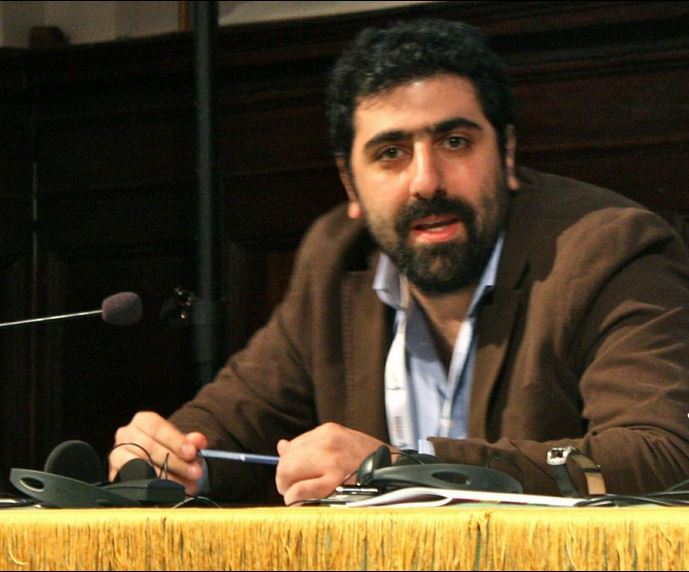
Discussing the future of Syria can’t be effective without an evaluation of the media coverage of the crisis and its influence. At the International Journalism Festival, Ugo Tramballi, Sakhr Al Makhadhi, Marwan Maalouf and Sam Dagher tried to outline the truth.
Since the beginning of the civil war in 2011, Syria has filled the front pages of almost all of the media outlets in the world. Government, opposition leaders, and fighters have been interviewed and immortalized through images. The complexity of the conflict, as well as the faces of the news, have complicated the understanding of the situation.
Sakhr Al Makhadhi, a journalist in the United Kingdom, was one of the first bloggers in Syria, beginning his blog in 2005. “Because I couldn’t cover Syria openly, I was traveling to the country anonymously”, he said, admitting to the use of student status for a duration of almost ten years. At this time, it was difficult to push media coverage of Syria.
Lack of information
When the conflict arose in 2011, very few people understood what was going on in Syria. Marwan Maalouf, cofounder of Menapolis and human rights consultant, described the feeling of the revolution, saying that the regime “won big time” with the beginning of media coverage of the revolution in Damascus. “Now, Syrian journalists are unable to go out of Syria or are already in jail”, he followed, describing the lack of information and censorship existing in the country. The population is mainly informed by external media.
With regard to regional media outlets, Marwan Maalouf said he had asked one of his Syrian journalists where she got the truth. She responded, saying that when she wanted to have the “Saudi Arabian truth”, she looked to Al Hayat. For the “Qatari truth”, she sought out Al Jazeera, and so on. It is clear, he said, that the conflict has illustrated the wrongdoings of the media, and how the destroy side are depending on type of media.
Suspicion for the media
At the beginning of the conflict, journalists were welcomed in Syria and protected by the rebels. Now, the situation has changed. Al Makhadhi explained that, after three years and the reactions of western leadership, local people have subsequently lost the value of the coverage from journalists.
Some reports made without verification caused anger throughout the population. Journalists are often independent, and working with a lack of resources. They can’t go everywhere and meet everyone. Also, ” only 30% of journalists are insured “, Maalouf added. The industry relies on citizen journalists who often work for free.
Over time, journalists became critical of the opposition and the FSA (Free Syrian Army) when they were embedded, touching the credibility of their hosts. ” You cannot anymore close your eyes on Sharia accord or violation of the rights by the opposition side “, Maalouf explained.
” A large piece of protest against the government of Bachar el-Assad has been transformed “, Sam Dagher explained, discussing the regional and international ramifications of the civil war. The conflict began polarized. During his work, the journalist from The Wall street journal and based in Damascus since over one year, managed both sides: governement forces and opposition composed of several groups. When he’s working in Damascus, he’s always struggling with the Bashar el-Assad regime about his interviews and trips. He has also been followed. “People of both sides accuse that we are not covering their point of view adequately “, he said.
Propaganda war
Journalists are attempting to cover what is going when it is possible, and to gather several pieces of the truth about the war. Sam Dagher experienced this in different Syrian towns. ” When you come for a week, you have a certain idea of the prejudice When you spend enough time, you discover with amazement the confidence of people “, he said. Nothing is what you though it was, he went on. ” There, it is an old regional territory. There, people are loyal to Bashar el-Assad “, he added.

Sam Dagher explained that almost everyone in Syra considers the Bashar el-Assad rule like “a regime castle “. In the battlefield, the situation changes. If he ask the information ministry, Bashar el-Assad will announce his victory on television very soon. According to colonels, officers, lieutenants and other people on front line, there are very different assessments.
Despite the courageous and active coverage by citizen journalists, they still answer to the public. Maalouf explained that Syrians were unable to form an “independent voice” over the past three years. “Unfortunately,” he said, “they use the same type of propaganda news as the regime.”
According to Sakhr Al Makhadhi, the opposition failed to have one powerful voice on media. ” They are not a dictatorship, not a monolithic block. They can’t control their message like Bashar el-Assad. And you can’t separate confidence on Assad media with massacre by his army “, he said.
International media and their idea of the truth
One of the problems is the lack of a Syrian voice in the conflict. The panel is representative of this fact, like the three journalists have admitted. Marwan Maalouf regrets the strong interest from the international media for the men with bear in the islamist and opposition side. ” Last few months, Syria has been abandoned in the editorial agenda. Editors are struggling to come up with new headlines “, he said.
In 2012, the media demanded to know about the end of the conflict. “That fed this mess,” Al Makhadi said. “In fact, that prolonged the war.” He regrets the absence of reports about peaceful manifestation. According to him, “non-violence activism is still going on.”

Two dangers can be identified. First, media may decide to drop the conflict from the agenda. Second, according to Maalouf, Al Jazeera and Al Arabiya play the worst role as they have their own agenda involving running the stories “we would like to hear and the Arab world would like to hear.”
Complexity in the field
Nobody is spared. The conviction and participation in the conflict are dividing families. One mother has lost her four sons; each fought for a different group, as a volunteer or soldier. Other families have seen disappearances. Some Alaouites don’t believe in the end of the conflict. Islamists have attacked, ambushed, and massacred women and children. “The way is dead. We can never go back to our world. I don’t think the regime is ever able to rule Syria again,” one villager told Dagher. Alaouite youth make efforts everyday to leave the country.
Generally reports are made in central Syria, near Damascus or Holmes. Just go a few kilometers to the east, Sam Dagher said, the zone is under rebel control. The regime has been fighting for three years, and has “only made incremental progress” he said.
In the opposition, the number of groups and intensity of the violence are increasing. Are Christians specifically a target? “Bombs don’t discriminate “, Marwan Maalouf said. “Islamist and extremists are targeting every single person who don’t look like them.” According to Sam Dagher, the targeting of Christians is real, remembering the tragedy in Maaloula in september 2013. Consequently, some Christians “choose the regime because it’s less dangerous of those evils “, he explained.
The cold war
Currently, the Syrian situation is “like a cold war”, Marwan Maalouf said. Sam Dagher has experimented with this situation at Selaheddin, a neighbor of Aleppo. In July 2011, the rebels entered the town. In 2012, they attempted to capture the city. ” One neighbor is on the regime control, and the three other on the rebel control “, he said. There are barriers, screens and sand mounds on both sides to protect citizens. ” The best we can do is to guard opposition “, one soldier confided to Sam Dagher.
At the beginning of the conflict, the “opposition wasn’t smart enough to negotiate.” In 2011, Marwan Maalouf said, they had something to put on the table. According him, Both sides have to agree that there is “ no way of going back”, and the opposition has to take the risk and negotiate “inside”.

Despite the complex situation, media have to play their role. The three journalists are in agreement: continuing the coverage of the conflict will paint a complete picture of the situation by providing a compilation of all truths. The Syrian story is not black and white, and lot of issues still have to be clarified.
“Remember that it is important to tell stories,” said Ugo Tramballi, a journalist from Il solo 24 ore and moderator of the debate. But, he concluded, ” you should not sacrifice a journalist for a story “. That is another subject question.
Elodie Armand @elodarm
Edited by: Gretchen Gatzke